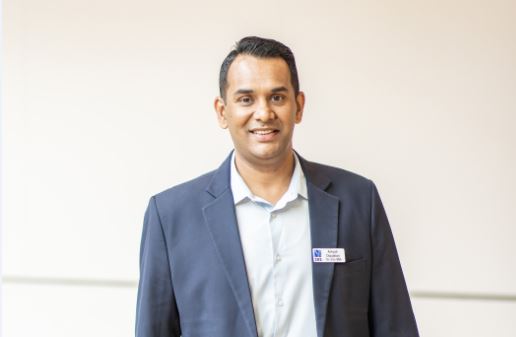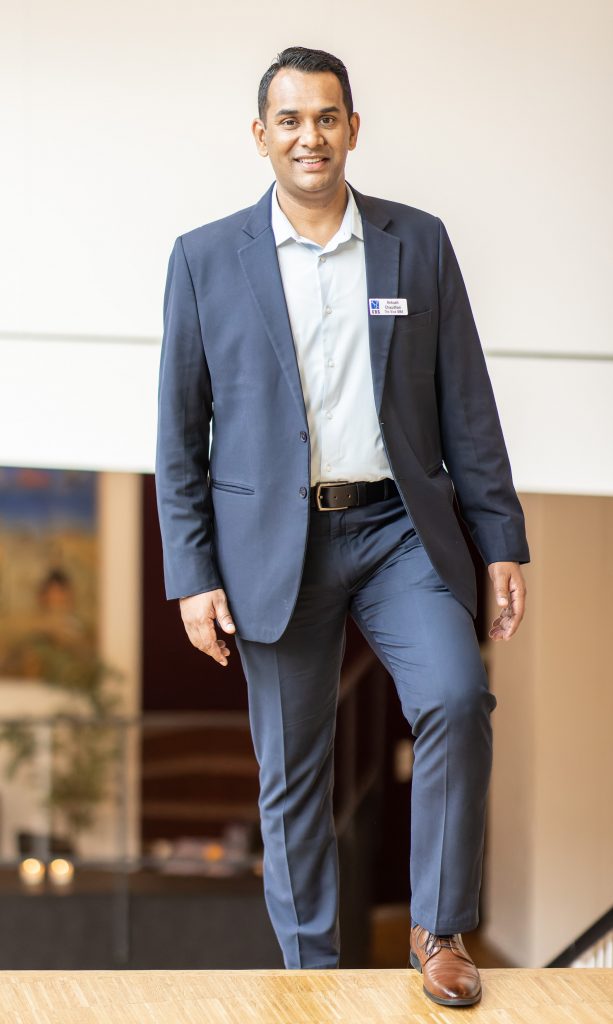
50 inspiring Champions – Hafnia’s Captain Ankush Chaudhari is inspired by the Blue MBA’s close connection to the maritime industry
Capt Ankush Chaudhari’s journey started in the maritime world as a 19-year-old, joining ship as a deck cadet. “As a young adult I always wanted to join the army, but fate had other plans. Coming from a family of army officers and seafarers it was an easy choice for me to go down one route or the other.
“I was a computer science graduate before I went to sea, and the only maritime degree I had was a BTEC (Business and Technology Education Council) higher nautical diploma.”
Now Capt Chaudhari, a fully qualified master mariner with extensive sailing experience, is senior manager of commercial operations at leading tanker company and pool operator Hafnia. Following the shift from sea to shore, he is pursuing his ambition to amass further leadership capabilities. He is over halfway through the two-year MBA programme in Shipping and Logistics (the Blue MBA) at Copenhagen Business School and expresses the deepest admiration for the course.
He says: “While MBA institutes are a dime a dozen in the market today, when I came across the Blue MBA, I realised that it is the world’s leading programme in shipping and logistics. It is very well connected to the industry. The in-depth knowledge of different segments of the shipping industry was its main focus, which stimulated me to go for it.
“After more than one year of the programme, I can already see the tangible difference it makes in my career.”
Capt Chaudhari‘s earlier career included four and a half years at Maersk Tankers progressing from a voyage execution officer to a senior voyage manager; followed by a similar employment heading owner’s operations for the Socar trading fleet of aframax and suezmax tankers.

Underlining how important it is to keep up with industry evolution, he recalls: “I spent around 13 years at sea, rising from a cadet to the rank of master mariner. Back in the day, shipping was still quite simple and certainly not as complex as it is today. Emails were still a novelty and phone calls back home were super-expensive.
“Over those years I experienced many new technologies and digitalisation take place on board the ships and ashore. Technological change is never-ending and with the world moving towards greater digitalisation the shipping industry is certainly not one that is behind.
“Artificial intelligence, blockchain, the internet of things and automation are becoming increasingly relevant for maritime transport.
“Digitalisation does not categorically mean unmanned shipping. It just simplifies the workload on a seafarer and increases productivity and profitability.
“One of the technological changes I went through at sea was the introduction of the Electronic Chart Display and Information System (ECDIS) which of course like many of my peers I resisted. Plotting routes on a computer was far removed from our original education of using paper charts. Coming from a background of computer sciences I knew that a computer is only as good as its user. Back then it was common perception that it worked on a perfect ‘garbage in garbage out’ principle and hence I needed to ensure giving more time to new technologies and to learn more.
“Similarly, installation of the Bridge Navigational Watch Alarm System (BNWAS) to monitor bridge activity and detect operator problems was also a new learning of how technology can contribute massively towards a safety culture on board.
“I once had to moor a fully laden tanker in Australia deploying an auto-moor system which basically meant using vacuum mooring cups and no mooring ropes. For me, hesitation was stepping in from day one but after acquiring proper knowledge of the system and de-briefing we managed to moor the ship without any ropes – a perfect example of how technology can contribute to faster turn-around and the safety of seafarers.”
Capt Chaudhari moved onto shore in 2013, working in oil tanker commercial operations. Since then, he has worked with industry leaders and tanker owners on the commercial operations side. Today he is a recognised expert in the field and a mentor for many young talents entering the industry.
“After sailing, being on the other side sitting in the office was very different. But this was beneficial in many ways. Whenever a decision was to be made on shore, I always put myself in the shoes of the master aboard the vessel, and it made things easier.
“My knowledge and experience from sea has helped me immensely ashore. Practical appreciation of proper planning, knowledge of cargo systems, various types of cargoes etc all lead to a profitable business model.”
Capt Chaudhari says: “I always wanted to pursue an MBA from the start.
“Irene Rosberg (programme director of the Blue MBA) was already viewed as a highly respected person in the industry and seeing her leading this programme was the icing on the cake.
“Another benefit of this MBA was that it required [part-time] physical attendance as I was not too keen to do an online MBA. The physical attendance meant meeting new leaders from different sectors and cultures and lecturers who have profound knowledge in the industry.
“In shipping we work with people from different cultures, backgrounds, and skillsets. Getting an MBA does not in itself mean to have a promotion or have a salary hike. It is to unlearn what we have learnt before and learn again and be recognised by your peers and seniors. Learning so many new things from different sectors has really broadened my horizon and my view towards the industry as a whole.”
With his fellow members of the Blue MBA Class of 2023, Capt Chaudhari is aiming to be equipped better to deal with the industry’s headwinds.
“Where the commercial industry of tankers is heading, it sure is a very challenging and interesting time,” he says with some understatement.
“The industry has faced a lot of turbulence in the last three years. With Covid and closure of some trading, tankers did benefit with more floating storage and high freight and time charter rates mainly due to the contango effect. Of course, everything comes with a price and this time it was seafarers around the world who paid.
“It’s a sad thing but whenever there is turbulence in the world in any way, shipping benefits, but with the onset of the pandemic, there were unsung heroes of the world who were not being heard. Ports and countries still needed the oil, food, and medical supplies which meant crew were also needed, and did not have unlimited possibilities to go home.
“Doctors were categorised as essential staff, but few companies considered seafarers who were sometimes still working 12 months at a stretch, leaving their families behind, to connect the world. Being an ex-seafarer, I could feel their pain. At Hafnia, we actively promoted more crew change clauses for deviating ships to sign off the crew. We all did face challenges, but we ensured we went more than the extra mile to ensure optimal working conditions, even if Covid meant, like the rest of the world, things were delayed.
“The war in Ukraine and the accompanying sanctions has led to freight rates rising but the global economy is under huge pressure too. Ton-mile demand has increased as the ships now need to travel further to transport oil to destination. There are not enough ships in the world today to transport this oil in the nick of time for consumption. So, we are looking at a somewhat bleaker future in the world of supply, demand, and consumption of resources. “We in the industry continue to work towards making the winter warmer, and as it’s called in Denmark to have a bit of hygge (the quality of cosiness and conviviality that engenders a feeling of well-being).”





